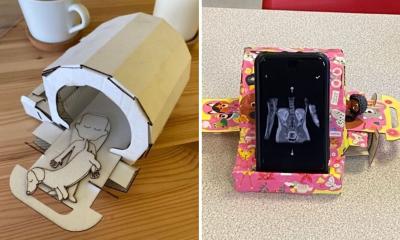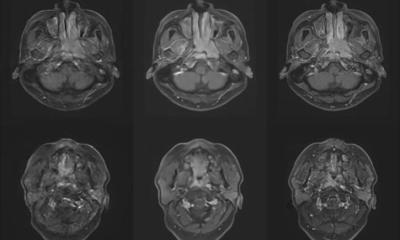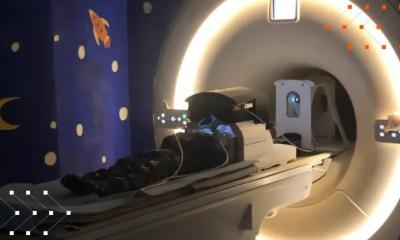Article • Immersive imaging distraction
VR system to reduce MRI scan anxiety
Claustrophobia or anxiety can overwhelm small children and people with cognitive difficulties, especially in a confining and noisy MRI scanner tube. Their restless reactions can then render scan images useless. To help such patients to relax during scanning, a team from King’s College London (KCL) has designed an immersive environment with a special virtual reality (VR) headset for use with MRI scanners.
Report: Mark Nicholls
The idea for this distracting system originated when Dr Tomoki Arichi, a Clinician Scientist and Clinical Senior Lecturer in the KCL Centre for the Developing Brain, presented Jo Hajnal, Professor of Imaging Science in the Centre, a Christmas gift of VR goggles. ‘Professor Hajnal realised that whilst using the goggles, the strong immersive experience meant he was completely unaware of what was going on around him and this inspired us to create similar technology for use inside an MRI scanner,’ lead researcher Dr Kun Qian explained. ‘We then went on to develop the technology through a multi-disciplinary collaboration of colleagues with a background in computer science, engineering, optical science, clinical and physics.’

Qian, a research associate in the Centre for the Developing Brain at KCL’s School of Biomedical Engineering & Imaging Sciences, acknowledged that having an MRI scan can be an ‘alien experience’, with scanning failure rates in under five-year-olds as high as 50 percent. Time and resource wastage can delay clinical decision making, he pointed out. ‘Even in those children who manage to complete the scan, movement artefacts can significantly degrade image quality and affect interpretation. Whilst this can be alleviated with sedation or anaesthesia, these are resource heavy and carry their own associated clinical risks.’
The researchers had observed that, when fully immersed in a virtual reality environment, people become unaware of what occurs in reality around them. Thus, they developed a system to replace a patient’s actual visual scene when having a scan with tailored VR content that is immersive and interactive, Qian said. ‘This removes the sensation of being inside an MRI scanner. We believe that it can potentially benefit all groups having a MRI scan, but in particular will help vulnerable populations with anxiety problems, and those with cognitive difficulties.’
Recommended article

News • VR app for children
Kids' fear of MRI: Let the penguins handle it
"You hear the noises, but they don't bother you at all": Since 2019, the “Pengunaut Trainer" has been preparing children for magnetic resonance imaging (MRI) examinations through role play. The app was developed under the leadership of the University Duisburg-Essen (UDE) and the Essen University Hospital (UK Essen).
This is a custom-built 3D printed MR-compatible VR headset; a pair of MR-compatible cameras (for eye tracking) and a MR-compatible projector for VR content display, which can be set up and removed between patients. The research team also designed the system to precisely match existing scanner hardware – in the case of King's College London, the head coil in a Philips Achieva 3T system.
Our VR headset is designed to be entirely light tight, so that the user cannot see their surrounding environment and is unaware of visual reminders of their position inside the MRI scanner
Kun Qian
With everything connected to a standard PC in the control room, patients control the system by using their eyes. They also can communicate with a carer outside the scanner. The aim is for the system to transform the MR examination from a passive and isolating experience into an active, engaging and interactive one. ‘Our VR headset is designed to be entirely light tight, so that the user cannot see their surrounding environment and is unaware of visual reminders of their position inside the MRI scanner,’ Qian added.
With the patient positioned in the scanner, the projector’s system immediately shows immersive 3D images which appear to surround the user. This continues till the examination ends. ‘Crucially, it means that a patient may be completely unaware of their surroundings during their whole time inside the scanner,’ said Qian.
The research team has incorporated real-life sensory experiences into the VR environment, such as the visual scene moving when the examination table moves, or animated characters responding to scanner noise. Using their eyes, the user can navigate through the virtual world to select content, such as films or games, and initiate, or terminate, a video link to their carer, meaning they can interact at any time during the scan with a companion via a webcam with microphone and a display monitor.
While the proposed system has clinical applications for the populations who find MRI stressful, the team believe it also has potential for neuroscience as a platform for MRI experiments studying fundamental cognitive processes, such as social communication, opening the way to gain new insight into how patterns of brain function, behaviour and social skills develop.
With positive initial feedback from participants, the next step is to test it on a larger and more varied group of users and patients. ‘We would also like to develop more content, specifically for some of the vulnerable groups and potentially tailor the environment for them if needed,’ Qian added. ‘As this content is likely to be very different, depending on age and cognitive capabilities, getting this right and tailoring it for different clinical and study populations is a key next step.’
Profile:
Dr Kun Qian is a post-doctoral researcher in the Centre for the Developing Brain, at the School of Biomedical Engineering & Imaging Sciences, King's College London. His research focuses on developing a non-intrusive MR-compatible VR system which avoids disturbing the magnetic environment and uses eye tracking as the main interface.
19.08.2021





